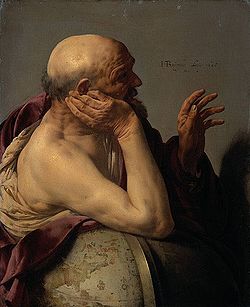Heraclitus
Heraclitus (540 B.C. - 480 B.C) was a great ancient Greek philosopher. He was known as "The Obscure" for his cryptic style. He is known to us through 125 fragments of his own works and by comments from later authors. He lived in Ephesus, a city in Asia Minor.
Heraclitus believed in universal impermanence ("everything is in flux") and that all things (notably opposites) were interrelated. Fragments #20 and #21 show this and also his most well known quote - that of the river.
20. Everything flows and nothing abides;. Everything gives way and nothing stays fixed.
21. You cannot step twice into the same river, for other waters and yet others go ever flowing on.
Heraclitus believed fire was the fundamental element of the universe and showed the natural change in the universe along with being in conflict with itself.
30. The phases of fire are craving and satiety.
31. It throws apart and then brings together again; it advances and retires.
At the core of Heraclitus's philosophy was the concept of logos which later influenced the stoic school of Greek philosophy and later New Testament writers. In this philosophy, logos is the plan, pattern, or reason of the universe. The opening of the Gospel of John reads In the beginning was the Logos, and the Logos was with God, and God was the Logos.
1. Although this Logos is eternally valid, yet men are unable to understand it -- not only before hearing it, but even after they have heard it for the first time. That is to say, although all things come to pass in accordance with this Logos, men seem to be quite without any experience of it - at least if they are judged in the light of such words and deeds as I am here setting forth.
64. Although intimately connected with the Logos, men keep setting themselves against it.
118. Listening not to me but to the Logos, it is wise to acknowledge that all things are one.
His view of the transcience of all things exerted a strong influence on Plato.
Heraclitus has influenced a number of other famous men, among them Aristotle, Nietzsche, Heidegger, and Karl Popper.
Sources
The New American Desk Encyclopedia, Penguin Group, 1989
